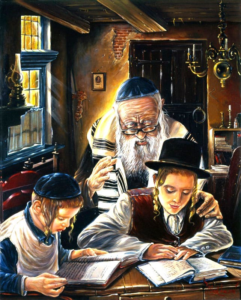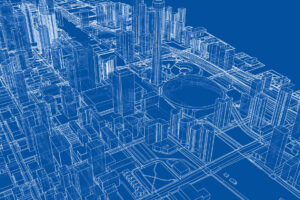Skipping Over the Mountains
Once a week I teach a class on Shir HaShirim to a very lovely group of women in Jerusalem, and this week’s lesson brought us to the verse: “The voice of my Beloved, behold it is come; skipping over the mountains, jumping over the hills.” (Shir HaShirim 2:8) Whenever I can find a teaching of Rabbeinu or Reb Nosson on what we’re learning, I always like to bring it in addition to the commentators on whom we usually rely.
The second chapter recalls the far past of the Jewish people, and this verse is our reminiscence of what it was like to first hear the promise of the coming redemption while we were still deep in the mire of Egypt, suffering. G-d’s voice, conveyed by His emissary Moshe Rabbeinu, powered by the merits of the forefathers and foremothers, came rushing toward us in leaps and bounds over every obstacle, even compressing time so that the end came nearly two hundred years before it was anticipated.
These words fill me with such a hopeful yearning for redemption; just as it was then, so will it be in the future. (Michah 7:15)
But what about today?
In one of his letters, Reb Nosson of Breslov teaches a beautiful lesson about how we can translate the unfettered hope expressed in the verse for our lives right now.
“…The mountains and hills represent all of the obstacles laid in our path to keep us from drawing close to Hashem. The evil inclination is compared to a mountain…
[Note: The sages taught that, in this world, the wicked perceive their evil inclination as an insurmountable mountain, and so they don’t even try to overcome it. In the end, they will be shown that it was only as broad as a hair—easily scaled. The righteous, on the other hand, look at their evil inclination as a hair in this world—they only focus on the next hairsbreadth of good to do and do not get caught up in fear—and in the next world they will be shown that it was really like a mountain, their hairsbreadths added up to such a towering height!]
“…And this is all the more true of someone who has already fallen; may Hashem save us from now on! Yet the Holy One skips over everything, for He is compared to a deer… Even though He ‘stands behind our wall’—the barriers that we have thrown up through our sinning—nevertheless even an iron wall cannot stand between the Jewish people and their Father in heaven…
“…And even if our bitterness [at our own shortcomings] threatens to overwhelm us, nevertheless we merited to attach ourselves to a man [the tzaddik] who is so complete, and who has the ability to rectify everything. We need to learn a lesson from this attribute of Hashem’s, this ‘leaping and jumping’ over all obstacles. I once told you in [Rebbe Nachman’s] name that he praised a certain tzaddik who, upon leaving this world, said, ‘Ibber geshpringen!’—‘I skipped over!’ We would not have known [the significance] of this, and certainly not have been able to follow this path without [Rebbe Nachman’s] guidance…
“With this path, one can dance nearly every day, and certainly on Shabbos and the festivals…Un takeh fort hup nor geshpringen, un gohr nit ibber getracht. Gott iz mit unz! [Indeed, one must rejoice no matter what; one must just skip over it and not brood on it at all. Hashem is with us!]” (Alim L’terufah, Letter #397)
As we stand on the verge of the holiest day of the year, a day of fasting and self-affliction, a day of sweet prayer and purity, we need to remember that the purpose of all our avodah is the restoration of our loving relationship with Hashem. We confess to wipe clean the slate, not to dwell and brood on what we have done wrong. We have five confessions that parallel the five times that the kohein gadol immersed and cleansed himself at each phase of the avodah. Every confession is a means of washing away the past as we move toward a clean and clear future. And may we merit to fulfill Rebbe Nachman’s teaching—that tears of teshuvah must be rooted always in joy, directed toward restoring a joyful and loving connection with our Creator. The letters of the word for weeping, bechiyah, are formed by the initials of the phrase from Tehillim: “B’shimchah yegilun kol ha’yom“—“In Your Name, they rejoiced all the day long.”
May Hashem help us to feel not deprivation on Yom Hakippurim, but liberation from the material things that bind us down, so that we are free to serve Him without any distractions. And for the mothers and others among us who will not be spending the day in synagogue, may we never forget that our homes are our sanctuaries, and the kohanim and levi’im spent their days not praying only, but speaking with Hashem while setting up the altars, slaughtering and preparing foods for the offerings, dealing with all of the sins great and small of the Jewish people, singing while they worked, and being, in their way, loving mothers to a very large and fractious family.
Wishing everyone an uplifting Yom Kippur, and may we meet on the other side, red transformed to white, ready to begin again.
- 9 comments























9 Responses
I wish I would have read this before Yom Kippur, but Baruch Hashem, this is exactly what I need right now! Extremely helpful and uplifting, much like everything else I’ve learned from you, Yehudis. I miss your classes tremendously and am very grateful you’ve started this blog!
Question, if I may- “…the wicked perceive their evil inclination as an insurmountable mountain, and so they don’t even try to overcome it.” Why does that make a person wicked?
Hi Bina,
I’m sorry that I didn’t get the piece out earlier. But it’s never too late!
Seeing obstacles as insurmountable barriers doesn’t make a person wicked, but it’s symptomatic of the wicked. When we’re daunted by our challenges, it doesn’t make us wicked. But if we remain in the mindframe where every obstacle the yetzer hara sets is impossible, then we are setting ourselves up to fall.
Trust in Hashem gives a person strength to overcome obstacles that seem insurmountable. When a person believes that his salvation depends on his own power, then he really might be in big trouble! But when he realizes that he can always turn to Hashem, and that with Hashem’s help nothing is too much for him to bear, then he really can skip over the mountains.
this is beautiful…wish i saw it before yom kipper:-)
thank you!
Ahhhhh thank you for clarifying that Yehudis! I was thinking when I read it that I very often feel mine’s an insurmountable mountain and that there are times where I feel it would actually be detrimental to try to overcome it.. so I just accept it and do a lot of crying and davening!!! So, phew, guess I’m doing okay!
Thank G-d, it’s a lesson that applies all year long, I think!
Have a wonderful new month, and a beautiful Shabbos!
You’re doing great; hang in there!
Yehudis:
I read some of this on Erev Yom Kippur & then again now. thank you so much for sharing this. challenges often do seem so overwhelming, but to know that we can also “skip over mountains” so much hope, so much possibility. Thank you. I’ll miss you in the Ukraine this year. I wanted so badly to be able to be with you with the tzadikim, but was not meant to be. I”H soon!!
3 things:
1. Thank you for all your teachings, now and before! And HaShem should bless you and us with many many more!
2. Any eitzah on how to feel the root of joy from within the remorse?
3. I know its a chutzpa, but would you be able to post a weekly summary of your Shir HaShirim class for all of us who can’t come?
Shaina,
Amen to #1!
Feeling joyful within the remorse could be compared to maintaining a pulse even when you have a headache. A headache is painful and it passes; without a pulse, a person would have no life at all. Even when one feels pain, beneath his pain drums a steady beat of life and vitality. The more he attends to the latter, the less the former afflicts him.
When I do something wrong, I regret it (I hope!). What restores me to myself so that I don’t get lost in my remorse is the awareness of the steady beat going on beneath–that Hashem loves me even though I made an error; that He is waiting for me to express my regret and start again; that Hashem’s quality of mercy is far greater than His quality of judgment; that He is at least as quick to forgive when I demonstrate real remorse as I would be if one of my children was to break down before me, no matter what had passed.
As for #3, it’s not a chutzpah, but it’s just not likely because I don’t have the time to write it up. If Hashem will help me, I will be more consistent about sending out the recordings to the mailing list.